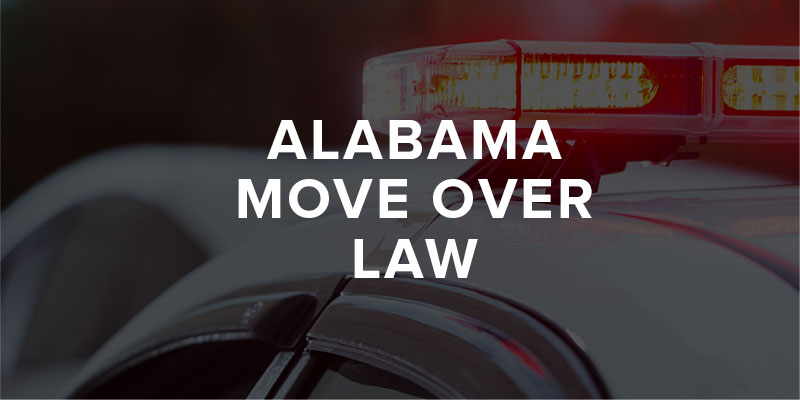What Is Alabama’s Move Over Law?
Alabama’s Move Over Act is something all drivers in the state should understand before hitting the road. Alabama Code Section 32-5A-58.2 establishes the Act, which requires all motorists to move over one or more lanes whenever possible for stopped law enforcement vehicles. Drivers must move over for other stopped vehicles as well. Failure to obey the state’s Move Over Act could result in fines and penalties – or worse repercussions if you strike a parked vehicle or person. Here’s what our Birmingham personal injury attorneys want you to know to stay within the confines of the law.
Provisions of the Move Over Act
Drive Safe Alabama reports that the number one cause of law enforcement deaths is traffic accidents. To reduce these incidents, Alabama law states that when certain vehicles have pulled to the side of the road or are parked on the roadside, all other drivers (as soon as it is safe) must vacate the lane closest to the stopped vehicle when driving on a highway with two or more lanes traveling in the same direction. The driver must reduce his or her speed to at least 15 miles lower than the posted speed limit if it’s not safe to vacate the lane, unless a law enforcement officer directs otherwise. Vehicles that require other drivers to move over are as follows:
- Authorized law enforcement vehicles
- Emergency vehicles
- Police or emergency vehicles displaying any visual signals
- Car crashes with flashing or amber rotating lights
- Utility service vehicle displaying rotating or flashing lights
- Garbage, trash, refuse, or recycling vehicles when actively on duty
On a two-lane road, other drivers must move as far away as safely possible from the stopped vehicle within the lane and slow to a speed at least 15 miles per hour less when the speed limit is 25 miles per hour or greater. The maximum speed limit changes to 10 miles per hour if the posted speed limit is less than 20. Violating Alabama’s move over law can result in a misdemeanor charge punishable with a $25 fine. A second violation comes with a $50 fine and third or subsequent violations cost $100. The Move Over Act does not excuse emergency vehicle drivers from driving with due regard for other drivers.
Recent Updates Will Strengthen the Move Over Law
Driving too closely to stopped vehicles, law enforcement officers, and others standing on the side of the road is extremely dangerous. Alabama lawmakers decided it was time to put an end to this hazard by putting space between moving vehicles and parked vehicles on the sides of roads. Now, they are going to take the Move Over Act a step further. The legislature created House Bill 158 in January 2018 to expand the law and extend it to any vehicle on or along the roadway.
HB 158, signed into law by Gov. Kay Ivey on April 4, 2018, will add provisions to cover vehicles parked on or along a road with flashing lights or vehicles engaged in performing official duties along a road. It will aim to keep everyone on the roadway safe – not just law enforcement, emergency, or utility vehicles. Regular motorists using private cars who have broken down, need to change a tire, or otherwise have to stop alongside the road will now also enjoy the protection of the Move Over Act. It also means that police officers can cite drivers for failing to move over or slow down for any parked vehicle.
In Pelham, Alabama, police officers plan on increasing the enforcement of Alabama’s Move Over Act after noticing too many drivers ignoring the law. The Pelham Police Captain has released his plan to keep an eye on stopped public service vehicles on the side of the road to make sure that other drivers are obeying the law and being safe. It will be up to the discretion of the police officers on how to enforce the law, when to give warnings, and when to write tickets. Keep yourself and others safe by always moving over and/or slowing down for any stopped vehicle in Alabama.
Contact our Birmingham car accident lawyers today.

